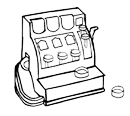How to get to know your baby during pregnancy?
What we're suggesting here is a sort of emotional Advent calendar. It's a little taste of the strong bonds you will form with your baby once he or she has shown up and you start to get to know each other. Tears of joy, smiles and laughter are on the agenda!
When we talk about getting to know baby, it is obviously through touch and hearing. To know who your baby will look like, you will unfortunately have to be patient. And don't talk to us about ultrasounds and other 3D images; we always come out of these appointments all shook up thinking we had seen his smile or his little hand waving at us when in fact it was just his elbow or a knot in the cord. And that's when you see something ... because there's nothing more unreadable than an ultrasound for the uninitiated. And if, on top of that, your baby is playing Britney to the paparazzi, you'll see absolutely nothing but the palms of his hands (but phew, he's got two) before birth.
Whilst waiting for the big day, we get to know our baby, commonly called "the star", through activities that create a bond in utero.
Let's digress for a moment before getting to the heart of the matter: all these techniques work ... but not with all babies. It's all a question of personality: already as a baby, there are the shy ones (Oh, hey, I'm not finished, leave me alone!), the sulky ones (I'm not going to like it anyway, I can feel it), the lazy ones (Oh, sport ... thanks but no thanks!) and the divas (when I want, if I want and that's that). So the key to all this prenatal communication is to try, to try again and to persevere until the first sign of interest from your little one.
Tell him stories
Tales, sweet words, jokes (if he starts hiccupping it's because you're really funny), secrets (about his other parent of course) and, why not, the thrilling story of your umpteenth day spent in pyjamas during confinement (we're not going to lie, it's not a pregnancy in 2020-2021 that will have prevented you from doing the four hundred tricks). No matter what, engage in the discussion to get to know baby.
The voice is indeed a powerful vector of links and emotions between the baby and its parents. Around the age of six months, the fetus is able to hear and recognise sounds and vibrations characteristic of its environment. Therefore, multiple experiments are carried out and the close circle (siblings, family, etc.) is involved. The intonations and volume of the voice are modified to discover what the baby prefers and how he or she reacts to it.
Once the link has been established and the voice recognised, it is common for the baby to express him or herself during these family discussions. And once out of the maternal cocoon, faced with the immensity of the unknown that awaits, the familiar voices will be of great comfort to the newborn.
"So I found out that Lily ganged up on me with her father to make me understand that my rendition of Whitney Houston's I Will Always Love You was not her favourite lullaby. From the first notes it was very clear ... boxing seemed to be her favourite sport" Marie-Noëlle, Milk Away MUM.
Introduce him or her to good music
You concentrate, things get complicated. You have two options: either you unpack the karaoke kit, the disco ball for the big nights and sing along, or you leave it to the professionals and open your playlist app.
This thorny point is cleared up but there is still the second one, which is just as touchy: what is good music? Yes, we know that asking this question can be tricky and fire up all sorts of debates amongst stable couples and families living in complete harmony, etc. To avoid any unnecessary drama: trust us and turn up the volume to any 90s hits. A safe haven. Especially since the nightclubs have been closed for a year now, don't hold back and enjoy the vibe with your boyfriend (as Diam's would say) and rock your baby to the sound of the music.
In general, the mini human will also get in the mood and you will enjoy a real moment of complicity all together. It's a fact that music calms people down. It is quite possible that your baby will remember the sounds he heard in the womb and will prefer them to others. Otherwise, the soft option to get to know your baby is the Bola, a small jewellery in the shape of a bell that hangs from a long chain to arrive right on the belly and that causes tinkling sounds with each movement of the mother. These regular and soft sounds rock the child andreassure him even after the birth.
Exchanging complicit high fives
More seriously, it is calledhaptonomy. It is defined as the science of human interactions and emotional relationships. Specifically, during pregnancy and once the baby is moving, it is possible to get to know the baby by attending sessions where you are taught to strategically place your hands on the belly and to communicate through touch.
For some couples, this experience is powerful and truly amazing. To realize that by the simple positioning of your hands you are able to influence the baby's attitude and position (he kicks, turns from one side to the other) and to provoke responses from him to your stimuli, this is verymoving.
Often, this concrete physical contact allows parents to fully realise the presence of the baby. Becoming a parent becomes less abstract. The benefits of haptonomy even extend to childbirth, as some fathers report that they were even able to guide their child during labour and relieve the mother.
Of course, to try the experience you'd better like to feel the baby move, which is not the case for all women and frankly, when you think about it, it's true that it's still a little surprising to feel and see that another living being has settled in the middle of your organs #alienmood.
Start daydreaming together
The best way to get to know your baby is to choose the activity that you enjoy the most and do it without moderation: massage, floating, yoga, meditation or hypnosis, any activity that promotes relaxation and well-being is likely to provoke reactions in your baby.
Of course, during these activities, we are fully aware of our body and its sensations, so it is the right time to connect with the baby and pay attention to the signs it sends us. It is often said that fetuses in utero are real sponges and that they feel both positive and negative emotions. This is a scientifically proven fact, as cortisol, the stress hormone, has the ability to cross the placenta.
"For us it was obvious that these moments of relaxation had a direct effect on Lily, the more we sank into deep relaxation during the hypnosis sessions, the more the little one felt she was attending a Zumba class, as if she was happy - and wanted to let us know - to be able to enjoy these moments of well-being too before she could really hug." Marie-Noëlle, Milk Away MUM.
It's up to you to find the best way to get to know your baby!
#milkawayapparel #inmumwetrust #baby #babylove #babyfever





